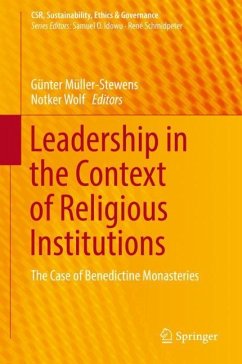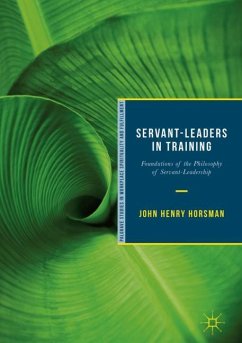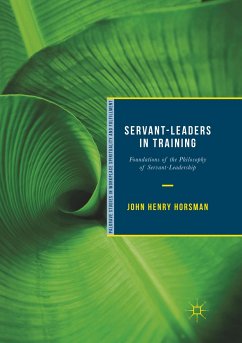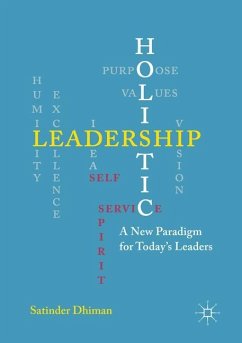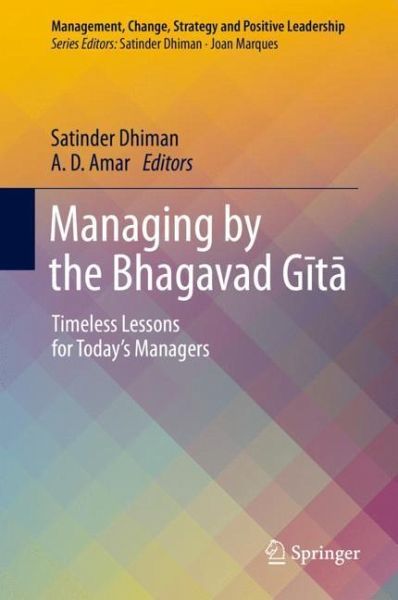
Managing by the Bhagavad G¿t¿
Timeless Lessons for Today's Managers
Herausgegeben: Dhiman, Satinder; Amar, A. D.

PAYBACK Punkte
19 °P sammeln!
Drawing upon the timeless wisdom of the Bhagavad Gita, a philosophical-spiritual world classic, this professional book highlights the spiritual and moral dimensions of management using an inside-out leadership development approach. It interprets the Bhagavad Gita's teachings on the personality types and psychological makeup of managers and employees; self-knowledge and self-mastery; and the leadership concepts of vision, motivation, and empowerment. This book covers topics such as training of the mind, ethical leadership, communication, stress management, and corporate social responsibility (C...
Drawing upon the timeless wisdom of the Bhagavad Gita, a philosophical-spiritual world classic, this professional book highlights the spiritual and moral dimensions of management using an inside-out leadership development approach. It interprets the Bhagavad Gita's teachings on the personality types and psychological makeup of managers and employees; self-knowledge and self-mastery; and the leadership concepts of vision, motivation, and empowerment. This book covers topics such as training of the mind, ethical leadership, communication, stress management, and corporate social responsibility (CSR). Collectively, the enclosed contributions provide managers with an enhanced outlook on management functions such as leading, planning, organizing, and controlling in today's organizations, particularly those run by knowledge workers.
Management research in the 20th century has mainly focused on the industrial paradigm characterized by a hierarchical structure of authority and responsibility with an individualistic focus on the personality of the manager. However, this traditional paradigm cannot solve many of the problems that confront leaders and mangers today. Recent studies have shown that values traditionally associated with spirituality-such as integrity, honesty, trust, kindness, caring, fairness, and humility-have a demonstrable effect on managerial effectiveness and success. Although traditionally interpreted as a religious-spiritual text, the Bhagavad Gita teaches these values which can be extrapolated and applied to practical management lessons in today's corporate boardrooms.
Applying the text of the Bhagavad Gita to the context of management, this book views the manager as an "enlightened sage" who operates from higher stance, guided by self-knowledge and self-mastery. It demonstrates how character is the key ingredient for effective management and leadership. This book is therefore applicable to all managers, from first-line to CEOs, in their management and leadership roles in organizations.
Management research in the 20th century has mainly focused on the industrial paradigm characterized by a hierarchical structure of authority and responsibility with an individualistic focus on the personality of the manager. However, this traditional paradigm cannot solve many of the problems that confront leaders and mangers today. Recent studies have shown that values traditionally associated with spirituality-such as integrity, honesty, trust, kindness, caring, fairness, and humility-have a demonstrable effect on managerial effectiveness and success. Although traditionally interpreted as a religious-spiritual text, the Bhagavad Gita teaches these values which can be extrapolated and applied to practical management lessons in today's corporate boardrooms.
Applying the text of the Bhagavad Gita to the context of management, this book views the manager as an "enlightened sage" who operates from higher stance, guided by self-knowledge and self-mastery. It demonstrates how character is the key ingredient for effective management and leadership. This book is therefore applicable to all managers, from first-line to CEOs, in their management and leadership roles in organizations.



